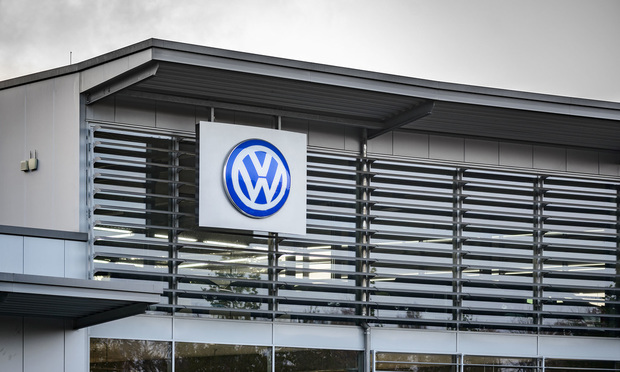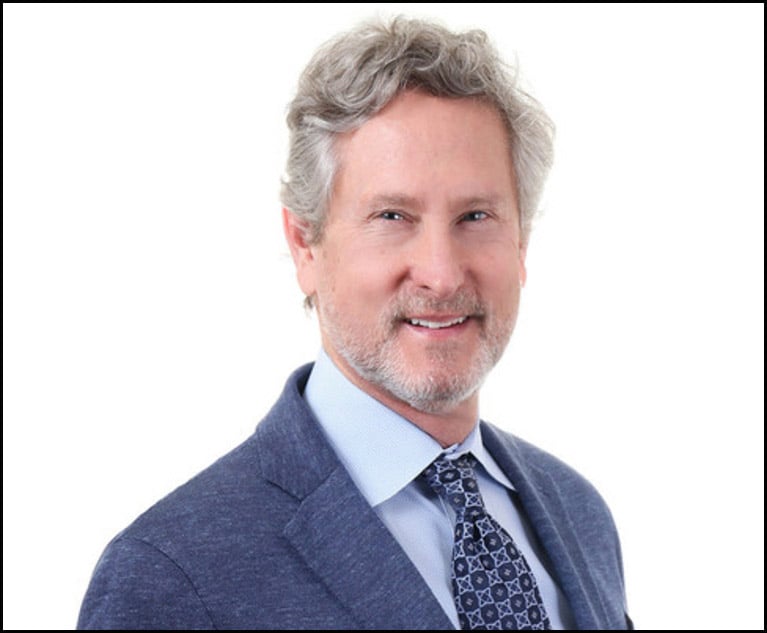Sold Your VW Before the Emissions Scandal? You've Still Got a Possible Claim, Judge Rules
U.S. District Judge Charles Breyer refused to dismiss a class action on behalf of consumers who sold their Volkswagen vehicles before Sept. 18, 2015.
October 05, 2018 at 05:36 PM
6 minute read
The original version of this story was published on The Recorder

Individuals who sold their Volkswagen “clean diesel” vehicles before the emissions scandal erupted can sue for economic damages, according to a ruling this week.
U.S. District Judge Charles Breyer, who approved the $14.7 billion settlement with Volkswagen in 2016, refused to dismiss a separate class action brought on behalf of tens of thousands of consumers who sold or terminated their leases before Sept. 18, 2015. That's the date on which the U.S. Environmental Protection Agency announced Volkswagen installed software in 600,000 U.S. vehicles to cheat emissions tests.
In an Oct. 3 order, Breyer wrote in the U.S. District Court for the Northern District of California that consumers had standing to pursue their claims against Volkswagen. He also allowed racketeering allegations against the engineering company Robert Bosch, which installed the software.
Breyer acknowledged that the complaint against Volkswagen brought “relatively unique allegations.” Unlike consumers in the prior emissions cases, plaintiffs were no longer driving their Volkswagen cars at the time the scandal broke, and probably financially benefited when they sold cars for which they paid premium prices. But, he said, they added a “novel twist.”
“They acknowledge that the price of the cars was likely inflated not only when they purchased them, but also when they resold them. Yet they contend that they did not recover all of their overpayment through resale because a portion of the premium they paid for a low-emission vehicle depreciated,” he wrote. “The fact of damage is not speculative here. When the allegations are taken as true and construed in the light most favorable to Plaintiffs, it is plausible that some portion of the $6,000 average 'clean diesel' premium was for a vehicle with low emissions, which is a feature that the class vehicles did not have.”
 U.S. District Judge Charles Breyer, Northern District of California/photo by Jason Doiy/The Recorder
U.S. District Judge Charles Breyer, Northern District of California/photo by Jason Doiy/The RecorderAnd, alongside “the plausible theory that a portion of the premium depreciated before Plaintiffs resold the cars,” Breyer added, the allegations “are sufficient at the pleading stage to support an injury in fact.”
Plaintiffs attorney Steve Berman put this in plain language, explaining: “I go in, and I buy a Volkswagen diesel, and I'm paying a premium for that diesel. Because of the advertisements about emissions and fuel economy, that makes the diesel $4,000-$5,000 over the price of a gas car. The minute I drive the car off the lot, I have a 20 to 25 percent depreciation. Let's say I then sold my car two months later to someone. So I've lost money, and part of the money I've lost includes the amount I paid for the diesel premium. That is the damage here.”
Yet such could be hard to prove. In his order, Breyer questioned how the plaintiffs intended to quantify the specific damages allegedly caused by their injuries; in particular, what portion of the depreciated premium was due to the emissions issue.
“Whether this depreciation-based injury can be accurately quantified and whether the former owners' losses are more than de minimis remains to be seen,” Breyer wrote. “But what matters at the pleading stage is that the fact of damage, rather than the amount of damage, is not speculative.”
Breyer gave plaintiffs 30 days to file an amended complaint with a “separate statement explaining how they intend to prove (1) the portion of the 'clean diesel' premium that was for a low-emission vehicle, and (2) the portion of the premium that depreciated.”
Volkswagen latched onto that part of Breyer's ruling, with spokesman Mark Clothier telling The Recorder that the claims “are without merit,” and that the company is pleased Breyer's order has “significantly narrowed the scope of plaintiffs' claims and their theory of damages.”
“Based on the Court's ruling, even if plaintiffs are able to quantify the alleged 'depreciation damages' they claim to be able to later prove, plaintiffs will still be chasing, at best, only a small fraction of what they had hoped to be able to recover through this lawsuit,” he added.
In its motion to dismiss, Volkswagen, represented by Robert Giuffra at New York's Sullivan & Cromwell, called the complaint a “legally baseless effort to obtain a windfall” based on claims that were “completely hypothetical and speculative.”
The company Bosch for its part moved to dismiss claims brought against it under the U.S. Racketeer Influenced and Corrupt Organizations Act. But Breyer, in allowing those claims to go forward, cited his own Oct. 30 ruling over similar arguments in a case involving Volkswagen dealerships.
A spokeswoman for Bosch, which was represented by Matthew Slater of Cleary Gottlieb Steen & Hamilton in Washington, D.C., did not respond to a request for comment.
Berman, of Seattle's Hagens Berman Sobol Shapiro, is one of 22 plaintiffs lawyers on the appointed leadership team in the Volkswagen emissions litigation. He and Elizabeth Cabraser, of San Francisco's Lieff Cabraser Heimann & Bernstein, who was lead counsel in the Volkswagen emissions case, have pursued separate lawsuits on behalf of consumers of “clean diesel” vehicles made by other automakers. On Feb. 20, U.S. District Judge Thomas Ludington of the Eastern District of Michigan allowed racketeering claims over GM's diesel trucks to go forward.
Then, on March 15, U.S. District Judge Edward Chen allowed racketeering claims to go forward against Fiat Chrysler and Bosch.
In this week's ruling, Breyer also agreed with a second theory that Volkswagen consumers before 2015 paid inflated financing fees, although he considered those claims “shaky” as they related to those who leased their vehicles. On a third theory—that consumers wouldn't have even gotten the cars had they known about the emissions defects—Breyer allowed the claims as to lessees but not owners since they got their money back when they sold their cars.
He also largely allowed consumer protection and false advertising claims to go forward. The complaint, however, lacked specifics as to whether the plaintiffs actually saw the alleged misstatements in advertisements touting Volkswagen's “clean diesel” vehicles, he wrote.
➤➤ Want deeper coverage of class action and mass tort litigation. Sign up here for Critical Mass, a weekly email briefing from Law.com.
This content has been archived. It is available through our partners, LexisNexis® and Bloomberg Law.
To view this content, please continue to their sites.
Not a Lexis Subscriber?
Subscribe Now
Not a Bloomberg Law Subscriber?
Subscribe Now
NOT FOR REPRINT
© 2025 ALM Global, LLC, All Rights Reserved. Request academic re-use from www.copyright.com. All other uses, submit a request to [email protected]. For more information visit Asset & Logo Licensing.
You Might Like
View All
Shareholder Democracy? The Chatter Elon Musk’s Tesla Pay Case Is Spurring Between Lawyers and Clients
6 minute read
Litigation Leaders: Mark Jones of Nelson Mullins on Helping Clients Assemble ‘Dream Teams’

Litigators of the Week: Rolling Back Elon Musk's $56B Tesla Compensation Package

Litigators of the Week: Quinn Emanuel Slashes $137M Racial Discrimination Verdict Against Tesla by Nearly 98%
Trending Stories
Who Got The Work
J. Brugh Lower of Gibbons has entered an appearance for industrial equipment supplier Devco Corporation in a pending trademark infringement lawsuit. The suit, accusing the defendant of selling knock-off Graco products, was filed Dec. 18 in New Jersey District Court by Rivkin Radler on behalf of Graco Inc. and Graco Minnesota. The case, assigned to U.S. District Judge Zahid N. Quraishi, is 3:24-cv-11294, Graco Inc. et al v. Devco Corporation.
Who Got The Work
Rebecca Maller-Stein and Kent A. Yalowitz of Arnold & Porter Kaye Scholer have entered their appearances for Hanaco Venture Capital and its executives, Lior Prosor and David Frankel, in a pending securities lawsuit. The action, filed on Dec. 24 in New York Southern District Court by Zell, Aron & Co. on behalf of Goldeneye Advisors, accuses the defendants of negligently and fraudulently managing the plaintiff's $1 million investment. The case, assigned to U.S. District Judge Vernon S. Broderick, is 1:24-cv-09918, Goldeneye Advisors, LLC v. Hanaco Venture Capital, Ltd. et al.
Who Got The Work
Attorneys from A&O Shearman has stepped in as defense counsel for Toronto-Dominion Bank and other defendants in a pending securities class action. The suit, filed Dec. 11 in New York Southern District Court by Bleichmar Fonti & Auld, accuses the defendants of concealing the bank's 'pervasive' deficiencies in regards to its compliance with the Bank Secrecy Act and the quality of its anti-money laundering controls. The case, assigned to U.S. District Judge Arun Subramanian, is 1:24-cv-09445, Gonzalez v. The Toronto-Dominion Bank et al.
Who Got The Work
Crown Castle International, a Pennsylvania company providing shared communications infrastructure, has turned to Luke D. Wolf of Gordon Rees Scully Mansukhani to fend off a pending breach-of-contract lawsuit. The court action, filed Nov. 25 in Michigan Eastern District Court by Hooper Hathaway PC on behalf of The Town Residences LLC, accuses Crown Castle of failing to transfer approximately $30,000 in utility payments from T-Mobile in breach of a roof-top lease and assignment agreement. The case, assigned to U.S. District Judge Susan K. Declercq, is 2:24-cv-13131, The Town Residences LLC v. T-Mobile US, Inc. et al.
Who Got The Work
Wilfred P. Coronato and Daniel M. Schwartz of McCarter & English have stepped in as defense counsel to Electrolux Home Products Inc. in a pending product liability lawsuit. The court action, filed Nov. 26 in New York Eastern District Court by Poulos Lopiccolo PC and Nagel Rice LLP on behalf of David Stern, alleges that the defendant's refrigerators’ drawers and shelving repeatedly break and fall apart within months after purchase. The case, assigned to U.S. District Judge Joan M. Azrack, is 2:24-cv-08204, Stern v. Electrolux Home Products, Inc.
Featured Firms
Law Offices of Gary Martin Hays & Associates, P.C.
(470) 294-1674
Law Offices of Mark E. Salomone
(857) 444-6468
Smith & Hassler
(713) 739-1250






